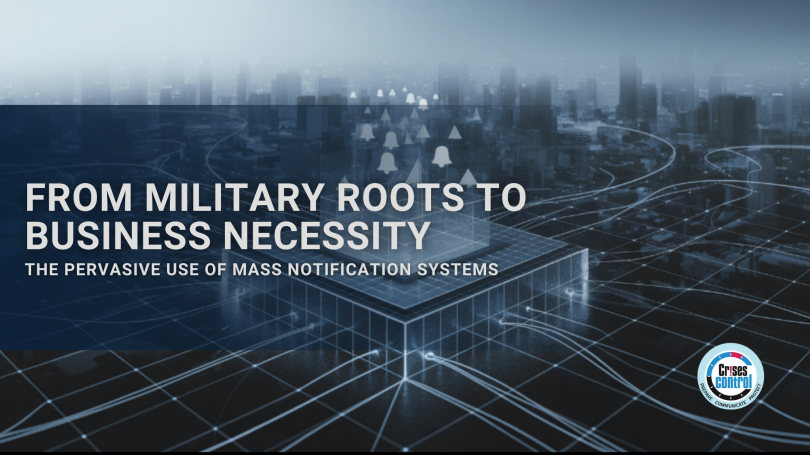The internet revolutionised how we communicate and operate on a global scale. Its roots, however, lie in an unlikely source: the military’s need for robust, secure, and efficient communication in the face of complex and rapidly changing environments. The Advanced Research Projects Agency (ARPA), a division of the US Department of Defense, birthed one of the earliest computer networks in the 1960s, with a primary aim – to create a communication network impenetrable to a nuclear attack.
The military’s influence on the internet is still evident today, with its decentralised structure designed to withstand attacks and disruptions. But the story doesn’t end there. This same principle of robust, efficient communication in complex environments has evolved into a vital tool for businesses worldwide: Mass Notification Systems.
The Birth of Mass Notification Systems
Just as the internet was forged to meet the military’s communication needs, Mass Notification Systems (MNS) emerged from similar requirements in the civilian world. The business landscape, like the military theatre, presented its own set of challenges in coordinating and communicating across vast distances and complex networks.
The Parallels
Coordinating Complexity: Both the internet and MNS were developed to tackle the intricate task of communication. Whether it’s military operations across borders or a multinational corporation’s crisis response, the challenge remains the same: ensuring information reaches the right people in real time.
Open Standards and Scalability: Just as the internet relies on open standards and protocols, Mass Notification Systems are built on the same principles. This allows them to be interoperable and scalable, adapting to the needs of organisations regardless of size or industry.
Universal Adoption: Both systems transcended their original purposes. The internet is now a fundamental part of our lives, while MNS are indispensable for a wide range of organisations, including government, military, and businesses.
Enhancing Incident Management: Just as the internet revolutionised global communication, MNS have played a critical role in improving the effectiveness of incident management and business continuity planning. They have become essential tools in minimising disruptions and safeguarding people, assets, and reputations.
Similarities in Functionality
- Real-time Communication: Both the internet and MNS are designed to transmit information and instructions in real time to a large audience. Whether it’s a critical memo or an emergency alert, speed is of the essence.
- Resilience in Adversity: Just as the internet is resilient to attacks and disruptions, MNS are engineered to function reliably and securely, even when conventional communication channels are compromised.
- Multi-format Messages: Both systems excel in versatility, allowing users to send various types of messages, be it text, voice, or video. This adaptability ensures the right message reaches the right people in the most effective manner.
- Integration Capabilities: Whether it’s emergency management systems or customer relationship management systems, both the internet and MNS are known for their seamless integration with other systems, enhancing their utility.
In Business Continuity and Beyond
In the context of business continuity and incident management, MNS shine as indispensable tools. They:
- Alert Employees to Threats: MNS are instrumental in alerting employees to potential threats and emergencies, ensuring their safety and well-being.
- Provide Instructions for Safety: During an incident, MNS provide clear instructions on how employees can stay safe and productive, thereby mitigating the impact on operations.
- Keep Stakeholders Informed: MNS are crucial in keeping customers and other stakeholders informed about the situation and the organisation’s response, fostering trust and transparency.
- Coordinate Multifaceted Responses: In complex incidents, MNS facilitate the coordination of responses across various departments and teams, ensuring a unified approach.
- Data-Driven Improvement: They also aid in data collection and analysis to refine incident response plans, making organisations even more resilient.
Conclusion
The journey from military necessity to business imperative underscores the transformative power of efficient communication systems. Just as the internet has reshaped the world, MNS have become an essential tool for businesses, governments, and organisations, enabling them to communicate effectively and efficiently during incidents. They are a linchpin in minimising disruption and safeguarding people, assets, and reputations.
Ready to empower your organisation with Mass Notification Systems? Don’t hesitate to request a live demo of Crises Control’s platform today. During this demo, we’ll tailor the experience to address any questions or concerns specific to your organisation. We are genuinely excited to get to know you better!







